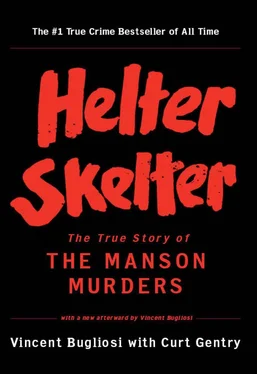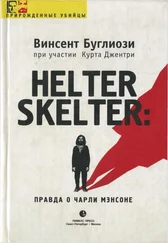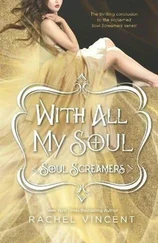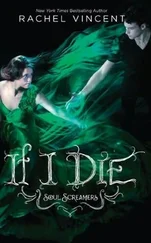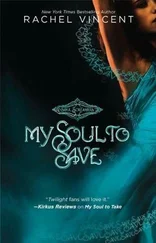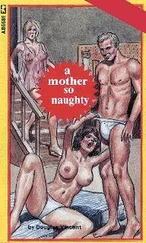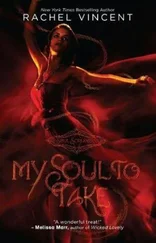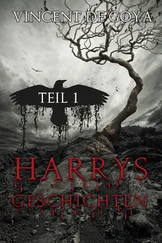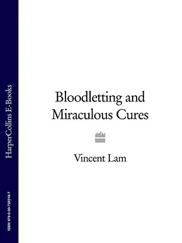The parade of perjurers began with little Squeaky.
Lynette Alice Fromme, twenty-two, testified that she was from an upper-middle-class background, her father an aeronautical engineer. When she was seventeen, she said, her father kicked her out of the house. “And I was in Venice, sitting down on a curb crying, when a man walked up and said, ‘Your father kicked you out of the house, did he?’
“And that was Charlie.”
Squeaky placed great importance on the fact that she had met Manson before any of the other girls, excepting only Mary Brunner.
In questioning her about the Family, Fitzgerald asked: “Did you have a leader?”
A.“No, we were riding on the wind.”
No leader, but—
“Charlie is our father in that he would—he would point out things to us.”
Charlie was just like everyone else, but—
“I would crawl off in a corner and be reading a book, and he would pass me and tell me what it said in the book…And also he knew our thoughts…He was always happy, always…He would go into the bathroom sometimes to comb his hair, and there would be a whole crowd of people in there watching him because he had so much fun.”
Squeaky had trouble denying the teachings of her lord and master. When Fitzgerald tried to minimize the importance of the Beatles’ White Album, she replied, “There is a lot in that album, there is a lot.” Although she claimed, “I never heard Charlie utter the words ‘helter skelter,’” she went on to say that “it is a matter of evolution and balance” and “the black people are coming to the top, as it should be.”
Obviously these were not the answers Fitzgerald wanted, and apparently he betrayed his reaction.
FROMME“How come you’re making those faces?”
FITZGERALD“I’m sorry, continue.”
Calling counsel to the bench, Judge Older said, “She can only harm the defendants doing what she is doing.”
I explained to Older, “If the Court is wondering why I am not objecting, it is because I feel that her testimony is helpful to the prosecution.”
So helpful, in fact, that there was little need for cross-examination. Among the questions I had intended to ask her, for example, was one Kanarek now asked: “Did you think that Charles Manson was Jesus Christ?”
Squeaky hesitated a moment before answering. Would she be the apostle who denied Jesus? Apparently she decided she would not, for she replied: “I think that the Christians in the caves and in the woods were a lot of kids just living and being without guilt, without shame, being able to take off their clothes and lay in the sun…And I see Jesus Christ as a man who came from a woman who did not know who the father of her baby was.”
Squeaky was the least untruthful of the Family members who testified. Yet she was so damaging to the defense that thereafter Fitzgerald let the other defense attorneys call the witnesses.
Keith called Brenda McCann, t/n Nancy Laura Pitman, nineteen. Though not unattractive, Brenda came across as a tough, vicious little girl, filled with hostility that was just waiting to erupt.
Her father “designed the guidance controls of missiles over in the Pentagon,” she said. He also kicked her out of the house when she was sixteen, she claimed. The dropout from Hollywood High School asserted there was no such thing as a Family, and Charlie “was not a leader at all. It was more like Charlie followed us around and took care of us.”
But, as with Squeaky and the girls who would follow her, it was obvious that Brenda’s world revolved around a single axis. He was nobody special but “Charlie would sit down and all the animals would gather round him, donkeys and coyotes and things…And one time he reached down and petted a rattlesnake.”
Questioned by Kanarek, Brenda testified that Linda “would take LSD every day…took speed…Linda loved Tex very much…Linda followed Tex everywhere…”
On cross-examination I asked Brenda: “Would you give up your life for Charles Manson if he asked you to?”
A.“Many times he has given you his life.”
Q.“Just answer the question, Brenda.”
A.“Yes, I would.”
Q.“Would you lie on the stand for Charles Manson?”
A.“No, I would tell the truth on the stand.”
Q.“So you would die for him, but not lie for him?”
A.“That’s right.”
Q.“Do you feel that lying under oath is a more serious matter than dying, Brenda?”
A.“I don’t take dying all that seriously myself.”
All these witnesses were extremely antagonistic toward their real families. Sandra Good, for example, claimed that her father, a San Diego stockbroker, had disowned her, neglecting to mention that this was only after he had sent her thousands of dollars and was threatened by Manson if he didn’t give her more.
Manson had severed their umbilical cords while fastening one of his own. And throughout their testimony it showed. Even more than Squeaky and Brenda, Sandy rhapsodized on Manson’s “magical powers.” She told the story of how Charlie had breathed on a dead bird and brought it back to life. “I believe his voice could shatter this building if he so desired…Once he yelled and a window broke.”
It was not until the penalty trial that the jury learned of the vigil of the Family members on the corner of Temple and Broadway. Rather movingly, Sandy testified to life there. “You can hardly see the sky most of the time for the smog. They are always digging; every day there is a new project going; something is always under construction. They are always ripping out something and putting something in, usually of a concrete nature. It is insane out there. It’s madness, and the more I am out there the more I feel this X. I am X’d out of it.”
After I’d declined to cross-examine Sandy, she very angrily asked, “Why didn’t you ask me any questions?”
“Because you said nothing which hurt the People’s case, Sandy,” I replied. “In fact, you helped it.”
I had anticipated that Sandy would testify that Manson wasn’t even at Spahn Ranch at the time the murders had occurred. When she didn’t, I knew the defense had decided to abandon the idea of using an alibi defense. Which meant they had something else in mind. But what?
Manson and the three female defendants had been allowed to return to court during the penalty phase. They were much quieter now, far more subdued, as if it had finally got through to them that this “play,” as Krenwinkel had characterized it, might cost them their lives. While Squeaky and the other Manson girls testified, their mentor looked thoughtful and pulled on his goatee, as if to say: They’re telling it like it is.
The female witnesses wore their best clothes for the occasion. It was obvious that they were both proud and happy to be up there helping Charlie.
The jurors shared a common expression—incredulity. Few even bothered to take notes. I suspected that all of them were mulling over the astonishing contrast. On the stand the girls talked of love, music, and babies. Yet while the love and the music and the babies were going on, this same group was going out and butchering human beings. And to them, amazingly enough, there was no inconsistency, no conflict between love and murder!
By February 4, I was fairly sure, from the questions Kanarek had been asking the witnesses, that Manson was not going to take the stand. This was my biggest disappointment during the entire trial, that I wouldn’t have the chance to break Charlie on cross-examination.
Читать дальше
